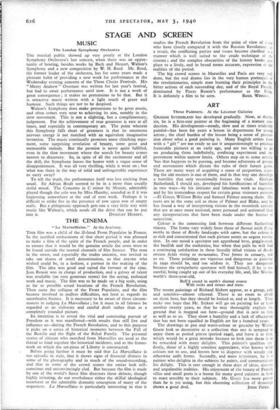STAGE AND SCREEN
MUSIC
The London Symphony Orchestra
THE musical public showed up very poorly at the London Symphony Orchestra's last concert, when there was an oppor- tunity of hearing, besides works by Bach and Mozart, Walton's Symphony and a new composition by W. H. Reed. Mr. Reed, the former leader of the orchestra, has for some years made a pleasant habit of providing a new work for performance at the Wednesday evening concerts of the Three Choirs Festivals. His "Merry Andrew" Overture was written for last year's festival, but had to await performance until now. It is not a work of great consequence ; it makes no pretensions to be that. But it is attractive music written with a light touch of grace and humour. Such things are not to be despised.
Walton's Symphony does make pretensions to be great music, and often comes very near to achieving its aim, notably in the slow movement. This is not a slighting, but a complimentary, judgement. For the achievement of true greatness is rare at all times, and especially in contemporary art. The point wherein this Symphony falls short of greatness is that its enormous nervous energy is not matched with an equivalent imaginative invention. The music continually promises some clinching argu- ment, some surprising revelation of beauty, some great and memorable melody. But the promise is never quite fulfilled, even in the slow movement where the search for beauty comes nearest to discovery. So, in spite of all the excitement and all the skill, the Symphony leaves the hearer with a vague sense of disappointment. It was all very thrilling, while it went on ; but what was there in the way of solid and unforgettable experience to carry away?
To tell the truth, the performance itself was less exciting than usual. Sir Adrian Boult seemed to be in a more than usually stolid mood. The Concerto in C minor by Mozart, admirably played though the solo was by Miss Humby, sounded as if it was happening somewhere at the end of next week. Perhaps it is difficult to strike fire in the presence of row upon row of empty stalls. But a phlegmatic approach gets one a very -little way with music like Walton's, which needs all the drive that can be put


































 Previous page
Previous page